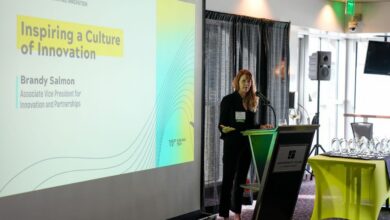Tesla should have been in Michigan. Here’s how to lure the next unicorn

America’s “Big Three” automakers used to dominate the automobile industry, and with all three at one time based in metro Detroit, they supercharged Michigan’s economy. But today, Tesla’s market capitalization is larger than the Big Three combined, though only starting production in 2008, first in California and now Texas. There are multiple lessons in that for Michigan, for other states that have suffered major manufacturing losses, and for our nation. Those lessons ― and the culture they can stimulate ― can fuel innovation and business growth throughout America.
I see this first-hand as co-founder and former CEO of Duo Security, Michigan’s first tech unicorn (unicorn is defined as a start up with a valuation of more than $1 billion) and the largest exit for a Michigan-based venture-backed software company when it was acquired by Cisco in 2018 for $2.35 billion. Since then, I’ve served on the U.S. Secretary of Commerce’s National Advisory Council for Innovation & Entrepreneurship, and invested significant time and resources to find ways in which states like Michigan, with such a massive and catalytic history of innovation and manufacturing, can reclaim that prowess.
Prioritize innovation, entrepreneurship to future-proof our state.
Michigan learned the hard way that it’s not enough just to get ahead ― you have to stay ahead.
Michigan has lost nearly half of its auto manufacturing jobs since 2000 and while that narrative remains dominant, still present is the expertise of many of the people who helped grow that industry and other thriving industries with global brands across a broad industrial base. From furniture and appliance manufacturers, pharmaceutical and health care, chemical, food and beverage, and financial services ― our state didn’t just start and grow a bunch of companies, but pioneered and dominated entire industries.
Michigan has deep technology, too, from our WWII-era development of remote sensing and surveillance, our scaling of the Internet’s commercial backbone, to today’s military and industrial applications of AI, and among the nation’s largest concentrations of industrial robots.
Nearly half the venture dollars invested in the state land in Ann Arbor, where the University of Michigan spends more on research than nearly any other university in the country.
Retaining and connecting those people is vital ― across industries and areas of expertise ― so that they can inform, inspire and mentor each generation of founders to stimulate innovation and new areas of economic growth. For Michigan, that includes embodied AI applications of sensing, thinking and acting not just in industrial robotics, but health care, energy, logistics, security and defense and finance to produce our next unicorns such as Acrisure, OneStream and Our Next Energy.
Michigan excels at getting things done, but execution is about doing things we already know how to do, while innovation is about tackling problems we don’t fully understand ― often by doing things we’ve never done before. Support for innovation must focus on verbs like connect, amplify and advocate ― not just nouns like companies, capital or talent. It’s the verbs of community development that move entrepreneurship forward!
Remove barriers to entrepreneurial brilliance.
Every Michigander deserves the opportunity to build a high-growth, high-wage business. But too often, struggling industries, including the auto industry, lobby for regulatory relief and legislative grants at the expense of greater economic vitality and dynamism in the state. The logical place for Tesla to grow should have been Michigan, given our expertise in auto manufacturing and technology, but restrictions designed to protect the Big Three had the effect of pushing the future out of state.

Statewide industry associations have a vital role to play, but they must be careful not to focus on protectionism rather than innovation. Similarly, elected officials who are used to being responsive to major employers in the state need to be sure that they are focusing on growing our next generation of companies and industries to create the high-wage jobs Michiganders desperately need.
Founders are typically “heads down” building and growing their businesses. They have to be sought out. Yet, we need to be ready to support them when they ask. Create a vibrant ecosystem to support high-growth entrepreneurship in the state, make it a true community, listen to entrepreneurs and remove the barriers in their way. The national nonprofit Right to Start is championing entrepreneurship as a civic priority for every community and is a great resource.
Commit to pay it forward.
Michigan ranks above average nationally for philanthropy. But, when it comes to supporting new businesses, not enough dollars or time is reinvested from those who win, to those who might be up next.
We organized the Michigan Founders Fund, a nonprofit group of more than 150 founders of high-growth companies who commit to donate 1% of equity in their companies when they exit, and help other founders on their way. The funds are then used to support community nonprofits and a stronger, more inclusive entrepreneurial ecosystem.
Similarly, the Renaissance Venture Capital fund-of-funds provides a bridge for our major corporations to help invest in our next generation of world-changing companies, creating a flywheel of success breeding success, at a time when Michigan’s university and philanthropic endowments invest nearly exclusively in out-of-state funds, and few Michigan family offices invest in local, emerging fund managers.
It’s time for Michigan to bet on Michiganders, and give people a chance to take a chance.
The potential for business growth in Michigan is extraordinary, with our state’s abundance of talent and resources. Realizing that potential depends, however, on connecting business, education and philanthropic communities to prioritize inclusive innovation and opportunity across the state. Culture drives behavior, and behavior drives results ― and if there’s one thing we really can’t afford to lose, it’s our entrepreneurial mojo!
Dug Song is co-founder and chair of the Song Foundation.



